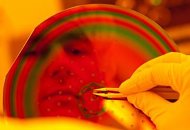qubit
Overclocked quantum bit
- Joined
- Dec 6, 2007
- Messages
- 17,865 (2.86/day)
- Location
- Quantum Well UK
| System Name | Quantumville™ |
|---|---|
| Processor | Intel Core i7-2700K @ 4GHz |
| Motherboard | Asus P8Z68-V PRO/GEN3 |
| Cooling | Noctua NH-D14 |
| Memory | 16GB (2 x 8GB Corsair Vengeance Black DDR3 PC3-12800 C9 1600MHz) |
| Video Card(s) | MSI RTX 2080 SUPER Gaming X Trio |
| Storage | Samsung 850 Pro 256GB | WD Black 4TB | WD Blue 6TB |
| Display(s) | ASUS ROG Strix XG27UQR (4K, 144Hz, G-SYNC compatible) | Asus MG28UQ (4K, 60Hz, FreeSync compatible) |
| Case | Cooler Master HAF 922 |
| Audio Device(s) | Creative Sound Blaster X-Fi Fatal1ty PCIe |
| Power Supply | Corsair AX1600i |
| Mouse | Microsoft Intellimouse Pro - Black Shadow |
| Keyboard | Yes |
| Software | Windows 10 Pro 64-bit |
Qubits are the quantum version of the smallest building block used in conventional digital computers today. They are subject to the laws of quantum physics, which means they possess the remarkable property of allowing them to be in a superposition of both zero and one states, until a measurement is taken, at which point they become either a one or a zero. This property allows the result of many possible outcomes to be calculated at once, making a quantum computer insanely fast and powerful - just the sort of thing you need for such things as climate modelling, code-breaking, Folding@Home style distributed projects, advanced artificial intelligence - and possibly gaming computers of the like never before seen, if they can be made small and cheaply enough. To give an idea of the enormous advance in processing power possible, physicist Rui-Rui Du of Rice University, Houston, Texas, who is researching the creation of stable qubits explained:

However, creating these qubits and keeping them stable enough to perform useful calculations with has been a serious challenge since research into quantum computers began. However, if an approach called "topological quantum computing" bears fruit, then keeping qubits stable might just get a lot easier. In this method, qubits will be made in pairs, with an almost immutable shared identity, which makes them much more stable and resilient to interference (presumably because one qubit can "error-correct" for corruption in the other qubit) which causes them to lose their delicate state of superposition, an effect called quantum decoherence.
Unfortunately, the catch is that these stable qubit pairs, known as "majorana fermions", have not yet been seen in experiments. Physicists now think that it might be possible to create these by "marrying" a two dimensional topological insulator to a superconductor. Due to the peculiar properties of topological insulators, the elusive majorana fermions should be created precisely where the two materials meet, allowing them to potentially be used for quantum computing.
Further refinements of topological insulators and experiments will determine whether such qubits can be made, whether they're stable enough and whether they can be used in a practical commercial computer. Finally, whether the technology to enable this kind of processing power will ever become viable and cheap enough to incorporate into a high performance desktop PC or gaming console remains to be seen.
View at TechPowerUp Main Site
It's not hard to see that using something like 64 qubits would increase processing power beyond anything we can imagine now.In principle, we don't need many qubits to create a powerful computer. In terms of information density, a silicon microprocessor with 1 billion transistors would be roughly equal to a quantum processor with 30 qubits.

However, creating these qubits and keeping them stable enough to perform useful calculations with has been a serious challenge since research into quantum computers began. However, if an approach called "topological quantum computing" bears fruit, then keeping qubits stable might just get a lot easier. In this method, qubits will be made in pairs, with an almost immutable shared identity, which makes them much more stable and resilient to interference (presumably because one qubit can "error-correct" for corruption in the other qubit) which causes them to lose their delicate state of superposition, an effect called quantum decoherence.
Unfortunately, the catch is that these stable qubit pairs, known as "majorana fermions", have not yet been seen in experiments. Physicists now think that it might be possible to create these by "marrying" a two dimensional topological insulator to a superconductor. Due to the peculiar properties of topological insulators, the elusive majorana fermions should be created precisely where the two materials meet, allowing them to potentially be used for quantum computing.
Further refinements of topological insulators and experiments will determine whether such qubits can be made, whether they're stable enough and whether they can be used in a practical commercial computer. Finally, whether the technology to enable this kind of processing power will ever become viable and cheap enough to incorporate into a high performance desktop PC or gaming console remains to be seen.
View at TechPowerUp Main Site
Last edited:











